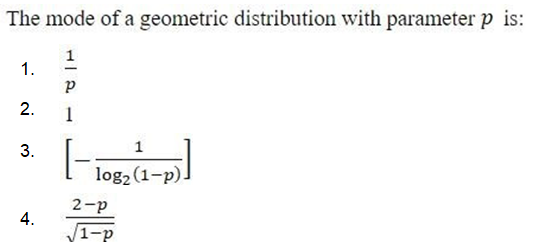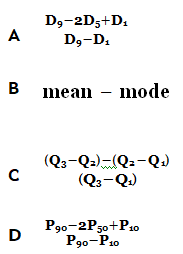Question
Working individually, 'A' can finish 60% of a task in 18
days, and 'B' takes 15 days longer than 'A' to complete the entire task. However, 'B' and 'C' working together can complete the task in 20 days. Now, What will be the amount of time 'C' would need to complete the same task when working alone.Solution
ATQ, Time taken by 'A' alone to complete the entire work = 18 ÷ 0.6 = 30 days Time taken by 'B' alone to complete the entire work = 30 + 15 = 45 days Let the total work = L.C.M of 30, 45 and 20 = 180 units Then, efficiency of 'B' = (180/45) = 4 units/day Combined efficiency of 'B' and 'C' = (180/20) = 9 units/day So, efficiency of 'C' alone = 9 - 4 = 5 units/day So, time taken by 'C' alone to complete the entire work = (180/5) = 36 days
If the random sample of size n is drawn without replacement from a finite population of size N, the correction factor for standard error of sample mean...

The six decile (D6 ) of 5, 3, 2, 6, 8, 4 is:
If A and B are manually exclusive events such that P(A)P(B) > 0 , then which option is correct?
If mean and mode of the distribution is 32 and 21, then the distribution:
The interquartile range excludes ___ of the values.
Which is not relative measures of skewness?

The purchasing power of money is equal to:
For the variables X and Y, we collect 4 observations with ∑ X = 10,∑ Y = 14,∑ X2 = 30,∑ Y2 = 54,∑ XY = 31 The regressio...
For an experiment we have the following data set: n = 4, ∑ X = a,∑ Y = 10,∑ XY = 21,∑ X2 = 30,∑ Y2 = 30 the correlati...
Relevant for Exams:



